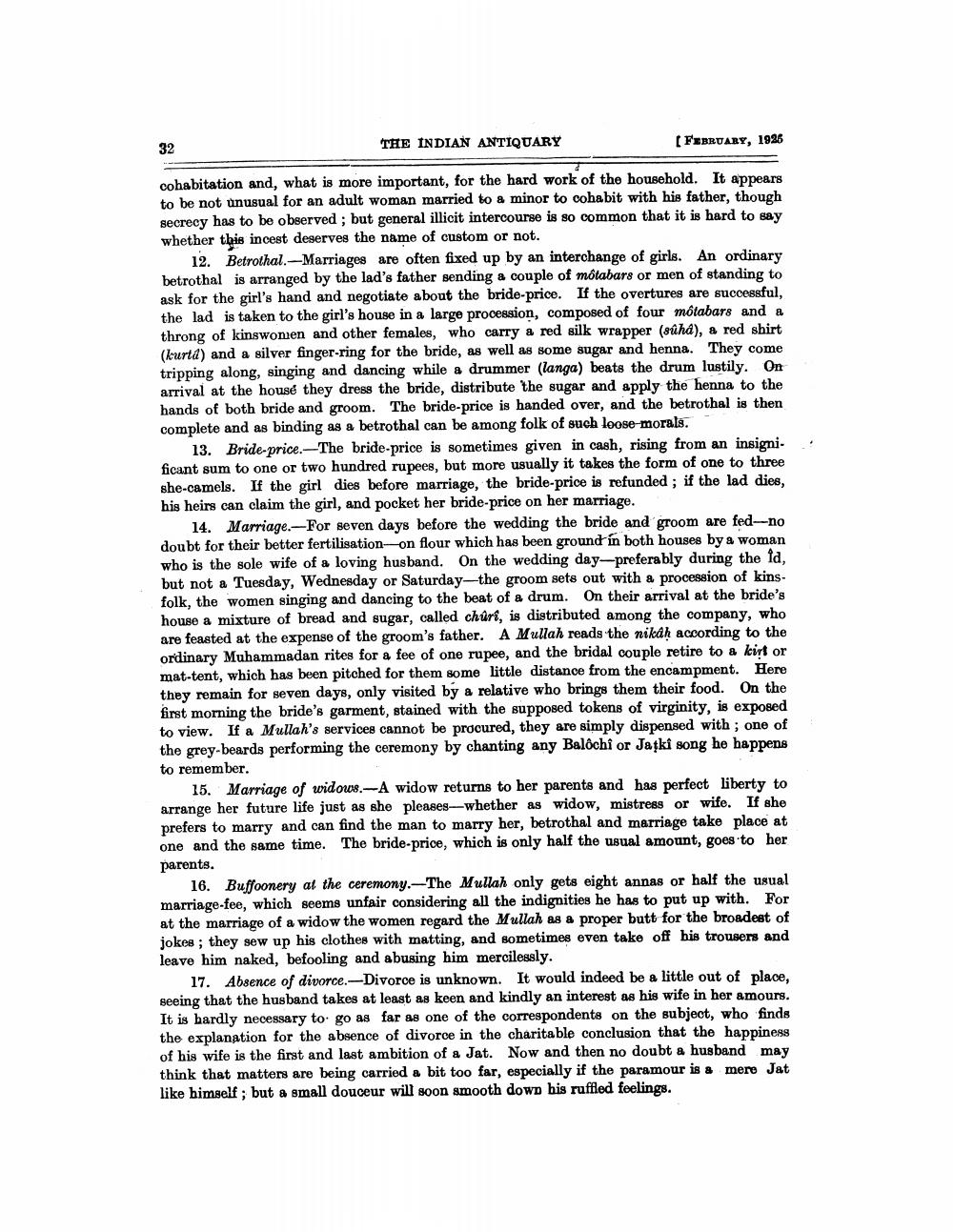________________
32
THE INDIAN ANTIQUARY
(FEBRUARY, 1926
.
cohabitation and, what is more important, for the hard work of the household. It appears to be not unusual for an adult woman married to a minor to cohabit with his father, though secrecy has to be observed; but general illicit intercourse is so common that it is hard to say whether this incest deserves the name of custom or not.
12. Betrothal.-Marriages are often fixed up by an interchange of girls. An ordinary betrothal is arranged by the lad's father sending a couple of mộtabars or men of standing to ask for the girl's hand and negotiate about the bride-price. If the overtures are successful, the lad is taken to the girl's house in a large procession, composed of four mótabars and a throng of kinswomen and other females, who carry a red silk wrapper (súha), a red shirt (kurtd) and a silver finger-ring for the bride, as well as some sugar and henna. They come tripping along, singing and dancing while a drummer (langa) beats the drum lustily. On arrival at the house they dress the bride, distribute the sugar and apply the henna to the hands of both bride and groom. The bride-price is handed over, and the betrothal is then complete and as binding as a betrothal can be among folk of such loose morals.
13. Bride-price.-The bride-price is sometimes given in cash, rising from an insigni. ficant sum to one or two hundred rupees, but more usually it takes the form of one to three she-camels. If the girl dies before marriage, the bride-price is refunded ; if the lad dies, his heirs can claim the girl, and pocket her bride-price on her marriage.
14. Marriage. For seven days before the wedding the bride and groom are fed-no doubt for their better fertilisation--on flour which has been ground in both houses by a woman who is the sole wife of a loving husband. On the wedding day-preferably during the id, but not a Tuesday, Wednesday or Saturday—the groom sets out with a procession of kinsfolk, the women singing and dancing to the beat of a drum. On their arrival at the bride's house a mixture of bread and sugar, called chûri, is distributed among the company, who are feasted at the expense of the groom's father. A Mullah reads the nikâh according to the ordinary Muhammadan rites for a fee of one rupee, and the bridal couple retire to & kirt or mat-tent, which has been pitched for them some little distance from the encampment. Here they remain for seven days, only visited by a relative who brings them their food. On the first morning the bride's garment, stained with the supposed tokens of virginity, is exposed to view. If a Mullah's services cannot be procured, they are simply dispensed with ; one of the grey-beards performing the ceremony by chanting any Balôchi or Jaşki song he happens to remember.
15. Marriage of widows.-A widow returns to her parents and has perfect liberty to arrange her future life just as she pleases-whether as widow, mistress or wife. If she prefers to marry and can find the man to marry her, betrothal and marriage take place at one and the same time. The bride-price, which is only half the usual amount, goes to her parents.
16. Buffoonery at the ceremony.-The Mullah only gets eight annas or half the usual marriage-fee, which seems unfair considering all the indignities he has to put up with. For at the marriage of a widow the women regard the Mullah as a proper butt for the broadest of jokes ; they sew up his clothes with matting, and sometimes even take off his trousers and leave him naked, befooling and abusing him mercilessly.
17. Absence of divorce.-Divorce is unknown. It would indeed be a little out of place, seeing that the husband takes at least as keen and kindly an interest as his wife in her amours. It is hardly necessary to go as far as one of the correspondents on the subject, who finds the explanation for the absence of divorce in the charitable conclusion that the happiness of his wife is the first and last ambition of a Jat. Now and then no doubt a husband may think that matters are being carried a bit too far, especially if the paramour is a mere Jat like himself; but a small douceur will soon smooth down his ruffled feelings.




